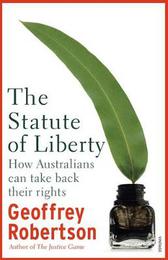
|
The Statute of Liberty: How Australians can take back their rights
Paperback / softback
Main Details
| Title |
The Statute of Liberty: How Australians can take back their rights
|
| Authors and Contributors |
By (author) Geoffrey Robertson
|
| Physical Properties |
| Format:Paperback / softback | | Pages:256 | | Dimensions(mm): Height 198,Width 128 |
|
| ISBN/Barcode |
9781741666823
|
| Classifications | Dewey:342.02 342.94085 |
|---|
| Audience | | General | | Tertiary Education (US: College) | | Professional & Vocational | |
|---|
|
Publishing Details |
| Publisher |
Random House Australia
|
| Imprint |
Vintage (Australia)
|
| Publication Date |
2 March 2009 |
| Publication Country |
Australia
|
Description
The Australian people emerged from a polyglot mixture of nationalities and other races: a kind of human minestrone. Not only a race, but a race apart, thanks to the kindness of distance. What distinctive moral vision have we attained from the struggles and sacrifices of our forebears? If we are to preserve the part of our heritage to do with freedom, we must write down the entitlement of every citizen in a way that politicians and public servants will respect. That means they must be turned into law. If they are not capable of legal enforcement then they are not 'rights', they are empty promises. Geoffrey Robertson puts the case for an Australian Bill of Rights cogently and dramatically, proving with evidence from other countries how a statute of liberty helps ordinary citizens and improves standards of governance and public services. He exposes the lies and urban myths the Australian people face from opponents of the bill, and shows how the charter he has drafted reflects the history and real contemporary values of Australians. This is a provocative argument for change, which explains that real democracy only exists if politicians give the courts power to defend citizens against abuses of their human rights by governments and public servants.
Author Biography
Geoffrey Robertson is familiar from Hypotheticals, Who Do You Think You Are?,The Justice Game and The Tyrannicide Brief. He is recognised as one of the world's leading human rights lawyers and he played a major part in the enactment of the British Bill of Rights. He has been credited with saving more than a thousand lives in obtaining landmark judgments from the Privy Council over death sentences in the Commonwealth. He was involved in the prosecutions of General Pinochet and Hastings Banda, and he was recently appointed by the UN Secretary General as a 'distinguished jurist' member of their Internal Justice Council.
|